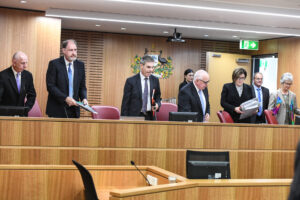Minimum Wage to Rise 3% for 2019-20
The Fair Work Commission has announced a 3% hike in Australia’s national Minimum Wage, effective July 1, taking it to $19.49 per hour. That increase is lower than the 3.5% increase implemented last year.
In our judgment, this is inadequate to meet the needs of low-wage workers – and the needs of Australia’s macroeconomy.
In explaining this year’s smaller boost to wages for the lowest-paid Australians, the FWC argued that recent weak GDP growth (and the risk of Australia’s first recession in 28 years) requires it to be cautious in boosting wages. But that argument is completely backward. The weakest component of GDP growth in the last year has been consumer spending – which actually declined in volume terms in the March quarter. Consumer spending accounts for half of all GDP, and nothing boosts consumer spending more directly than increasing workers’ pay.
Another argument raised by the FWC is equally unconvincing: it pointed out that incremental tax cuts promised by the incoming Coalition government will supplement incomes for low- and middle-income workers. But those tax cuts are of no value for the hundreds of thousands of Australian workers who currently pay no income tax (since their wages are too low). And even for middle-income workers, the benefits from those tax cuts are far smaller than the steady improvements in income resulting from healthy ongoing wage increases.
The Centre for Future Work recently compared the impacts of tax cuts to regular wage gains, and the conclusion is clear: regular annual wage increases are the only way to sustainably improve living standards over time. Please see our research here. Moreover, workers ultimately PAY for those tax cuts in foregone services (which must inevitably be reduced due to fiscal constraints), so the net contribution of tax cuts to living standards is non-existent.
Many commentators have pointed out that the 3% increase is higher than the current rate of inflation. In fact, inflation is currently running at 0% (in the March quarter), reflecting very weak macroeconomic conditions. Indeed, weak wages are part of the cause for very weak inflation: unit labour costs are the biggest influence on prices. If wage increases are restrained purely because inflation is low, this risks setting off a downward, deflationary cycle in wages and prices. Normal wage increases (in the range of traditional rates of 4% per year or more) are essential to anchor price levels, even in times of macroeconomic weakness.
So any increase in the minimum wage is higher than current inflation – but that is cold comfort. RBA Governor Dr Philip Lowe has indicated that annual 3.5% wage increases are necessary (when combined with ongoing productivity growth) for the economy to match the RBA’s 2.5% inflation target. In that regard, the FWC should have aimed higher with this year’s increase.
International and Australian evidence (including from the RBA itself) is clear: minimum wage increases do not “destroy” jobs. Stronger purchasing power is essential to offset other sources of weakness in the macroeconomy, including very poor business investment. In our judgment, the FWC should have increased the minimum wage by twice as much (6%), in order to boost consumer incomes and spending power, and move toward a “Living Wage” for low-income Australians. (See our primer on the Living Wage.)
Despite those criticisms, this 3% raise for close to 1/4 of Australian employees will provide a crucial boost to wage growth. And it is much better than the under-2% raises for non-Award workers that the private labour market is still delivering. We recently studied the impact of last year’s minimum wage increase on average wage growth. We found it single-handedly explained one-third of all the increase in wages last year.
The importance of active measures to boost wages has never been clearer. Waiting for “market forces” to reverse recent record weakness in wage growth will not work. Pro-active policies to support wage growth are essential to build more balanced and sustainable economic momentum. And nothing is more important in that policy mix than strong, sustained increases in the minimum wage.
You might also like
The continuing irrelevance of minimum wages to future inflation
Minimum and award wages should grow by 5 to 9 per cent this year
Analysis: Will 2025 be a good or bad year for women workers in Australia?
In 2024 we saw some welcome developments for working women, led by government reforms. Benefits from these changes will continue in 2025. However, this year, technological, social and political changes may challenge working women’s economic security and threaten progress towards gender equality at work Here’s our list of five areas we think will impact on
Does leave for menstruation and menopause advance women’s rights and gender equality at work?
As pressure grows for action to establish new work rights, including additional leave, for those who experience menstruation and menopause, the Centre for Future Work’s Senior Researcher, Lisa Heap, canvases the debate about whether these rights will advance gender equality at work.


